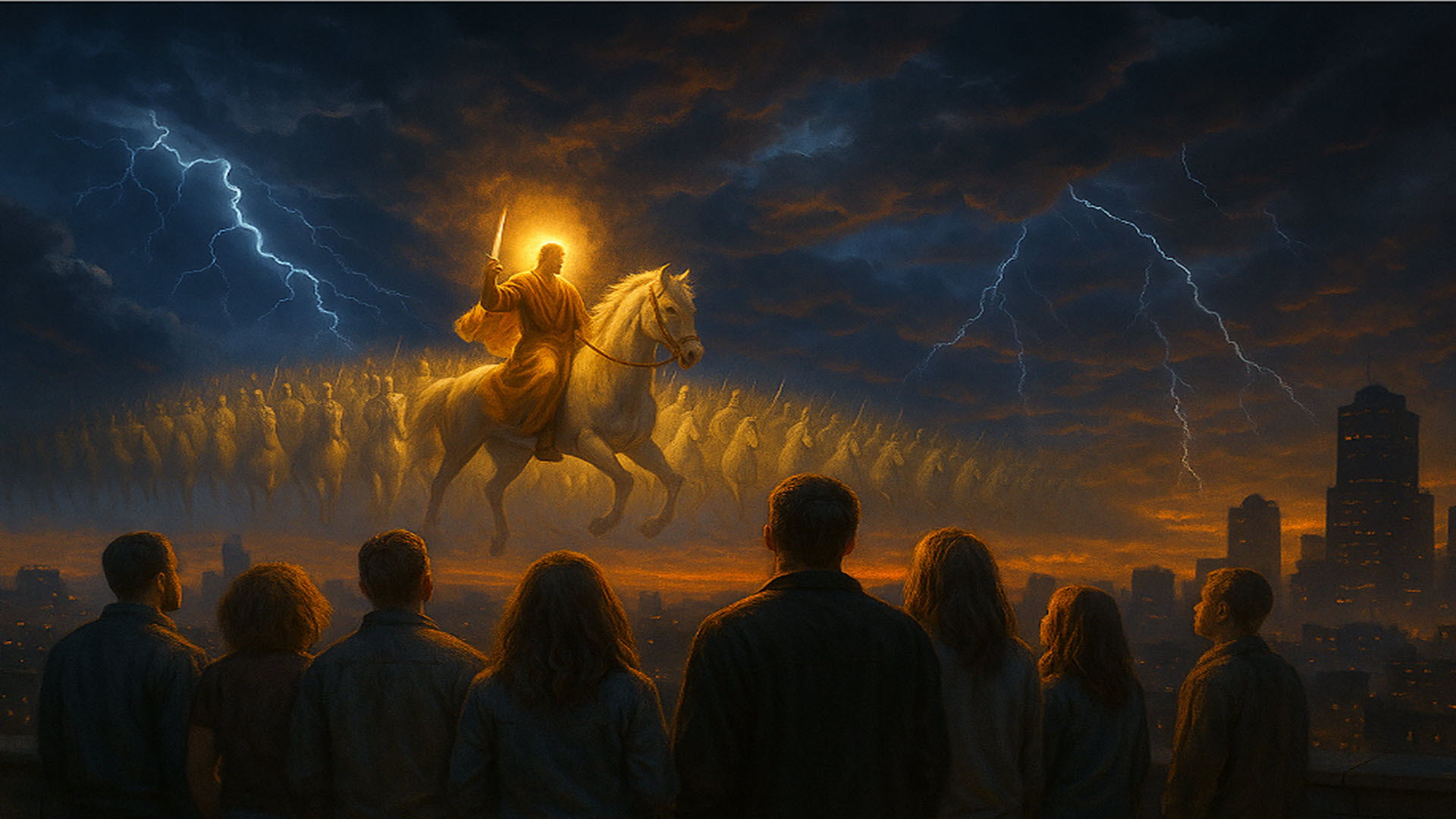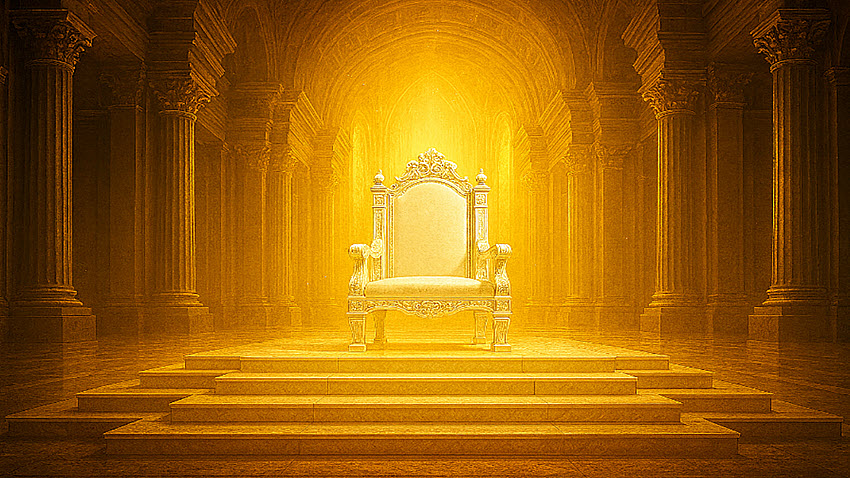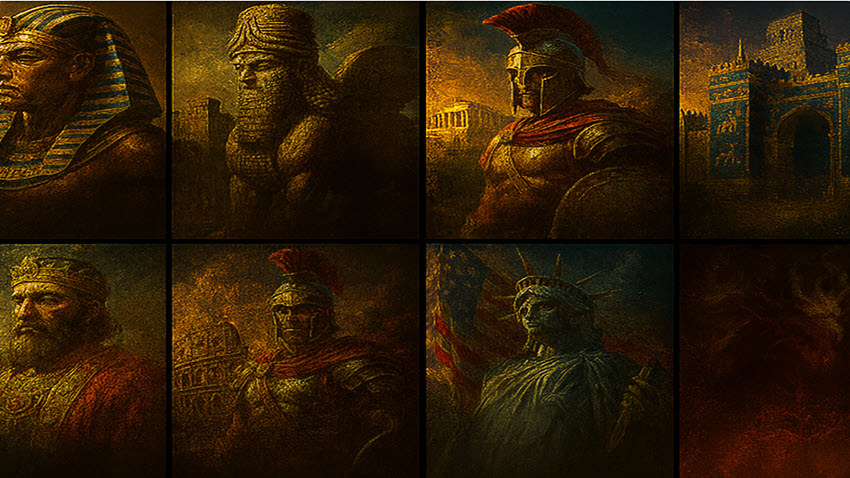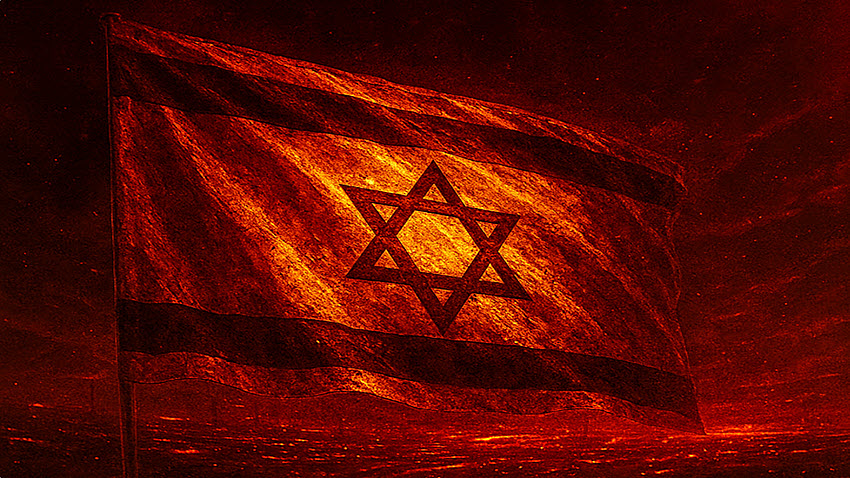Christ called all the Judeans to leave Jerusalem. By God’s judgment, Jerusalem had to be destroyed:
„And as He was going out of the temple, one of His disciples said to Him, Master, look at these stones and these buildings. And Yeshu answered and said to him, Do you see these great buildings? There will not be left here one stone upon another, except they throw them down.” – Mark 13:1-2.
„And when He came near and saw the city, He wept over it. And He said, If only you had known at that day the things that make for peace. But now they are hidden from your eyes. For the days are coming upon you, in which your enemies will build a mound against you, and will surround you, and will close you in on every side, and will overthrow you and your children within you; and they will not leave in you one stone upon another, because you did not recognize the time of your visitation. Then He entered into the temple and began to drive out those who were selling things…” – Luke 19:41-45.
“When you see the abomination of desolation, spoken of by the prophet Daniel, standing in the holy place, let the reader understand/hearken, then let those in Judea flee to the mountains… For then there will be great tribulation, such as has not happened from the beginning of the world until now, nor ever will” – Matthew 24:15 and 21.
“The Kitios (as a symbol of the power of Rome) will come and subdue him and punish him. When he returns, he will be angry with the covenant of the Holy One. He will act, and when he returns he will take action against them because they have abandoned the covenant of the Holy One. Armed forces will come from him and profane the holy place of fear. They will forbid sacrifices and leave there the abomination of desolation” – Daniel 11:30-31 (Septuagint).
People who believed in Christ and the prophets abandoned Jerusalem. People who did not believe were: killed or taken prisoner.
Let us ask the question: why did they show disbelief towards Christ, the apostles and prophets?
Did they love gold, luxury, and power so much that they could not leave this place?
Josephus Flavius describes this time of the Judean rebellion in his book: „The Jewish War”. He calls them jews, although we do not yet encounter such a word in the New Testament.
Let us look at these people, NOT as heroes, but as rebels acting against the law/prophecies of God. This story is a warning to Christians. We still have many prophecies to fulfill, which God announces through His servants.
Whoever does not take them into account, whoever ridicules them, disregards them, will end up like those unfaithful Judeans.
Here is an excerpt from the book “The Jewish War” by Flavius Josephus:
„Titus withdrew to Antonia, intending to attack them with all his might the next day and surround the temple with his troops. But God had long ago sentenced that Temple to fiery destruction, and now from the depths of time emerged the tenth day of the month of Loos, designated by fate, the same day that had seen the burning of the first temple by the king of the Babylonians. And none other than the Jews gave the reason for this, and it was through their fault that the second conflagration of the temple occurred. For Titus had scarcely left, when the insurgents, after a short break, attacked the Romans once more, and a fight broke out between the garrison of the Temple and the soldiers assigned to extinguish the buildings of the inner courtyard of the temple, who, pursuing the fleeing Jews, reached the Tabernacle itself. A certain soldier, without waiting for anyone’s order or for the consequences of his action
¹²⁹⁷Loos — Yiddish: Ab, August. [translator’s note]
¹²⁹⁸burning of the first temple — according to Antiquities X, VIII, : „on the first day of the fifth month”, so the first of August (Ab), not the tenth. [translator’s note]
without thinking, as if it were a blind instrument of a higher decree, grabbed a firebrand from the fire¹³⁰⁰ and, standing on the back of his companion¹³⁰¹, threw it through the golden window on the north side towards the buildings surrounding the Tabernacle. The flames had scarce appeared when the Jews raised an unheard-of clamour, which only such a misfortune could breathe from their breasts, and ran to save them; no one thought of his own safety any more, and each one mustered superhuman strength, since he was threatened with destruction, which was the main object of their care. Titus was informed of this event by a messenger. He was resting in his tent after the fight. He immediately jumped up and, in only what he was wearing, ran to the Tabernacle to order rescue. All the leaders, and the legions, after the leaders, moved by this event, ran after him. There was a great clamour and a crowd, easily understandable where such crowds could gather in disorder. Caesar shouted at the fighters and waved his hands at them, wanting to let them know that the first thing they had to do was put out the fire, but the soldiers did not hear his voice at all, because he was lost in the general din, and they did not pay attention to the hand signals either, because they were completely absorbed in the fighting and the excitement of the battle. No orders, no threats could stop the mad attack of the legion; fury now took command and drove the troops forward. Such a crush arose at the gates that many were trampled, many were pushed into the smoking ruins of the cloisters, where they suffered the same fate as the dead. Those who later found themselves near the Temple pretended not to have heard Caesar’s cries at all; on the contrary, they shouted to those who were pressing in front of them to throw fire at the Temple itself. The insurgents lost their last hope of containing the blaze, they were murdered everywhere or forced to flee. Along with them, the weak and defenseless people died in droves, wherever they happened to come into contact with an enraged Roman soldier; especially near the altar, a mound of the fallen was piled up, and a river of blood flowed down the steps of the Tabernacle, and the bodies of the murdered rolled down. When Caesar saw that there was no way to stop the raging soldiers, and the fire was spreading with increasing violence, he, surrounded by his leaders, crossed the threshold of the Holy of Holies in the Tabernacle. He carefully examined every detail of the interior, and everything he saw there was much more beautiful than the fame circulating in foreign countries had proclaimed, but it was quite in line with what the locals had told him with excitement. Since the flames from the neighboring buildings had not yet reached the Temple, he thought, and quite rightly, that it would still be possible to save this magnificent work. Having run outside, he called upon the soldiers to put out the fire, and when that did not help, he ordered Liberalis, the centurion of his bodyguard, to drive the disobedient soldiers with sticks. But the fury of the soldiers, their hatred of the Jews, and their battle frenzy proved more powerful than Caesar’s will and the fear of the punishments he had at his disposal. The majority rushed forward, carried by the hope of gaining rich booty, for they thought that if so much gold shone outside, the interior must be a veritable storehouse of various treasures. In the meantime, at that moment, when Caesar ran out of the Temple to stop the raging army, one of the soldiers who had rushed in set fire to the hinges of the gate in the darkness. So when suddenly flames began to come from inside the Temple, the generals with Caesar withdrew, and no one stopped the soldiers from spreading the conflagration.
This is how, against Caesar’s will, the Temple burned.
However painfully the heart clenches at the thought that a work more admirable than anything seen or heard of has been wiped from the face of the earth, a work incomparable in its vastness, magnificence, the richness of every detail, and above all in the significance it had in the world, let this heart be consoled by the fact that inexorable fate places its mighty hand on all life, on every work of human hands, and on every place dear to man. And it is only astonishing that this fate operated here in such precise periods, because it appointed for the conflagration of the Tabernacle not only the same month, but even the same day, on which the first Tabernacle, as I have already mentioned, was destroyed by the Babylonians. From the building of the first temple by King Solomon until the destruction of the second temple in our days, which falls in the second year of Vespasian’s reign, there passed one thousand one hundred and thirty years, seven months and fifteen days; and from its second building by Haggai in the second year of Cyrus’ reign until its destruction under Vespasian, six hundred and thirty-nine years and forty-five days.
During the conflagration of the Temple, the soldiers indulged in robbery and murdered Jews by the thousands, sparing no age or dignity; children, old people, people. Laypeople, priests, all classes were killed in the frenzy of battle without distinction, not paying any attention to whether someone begged for mercy or resisted. The groans of the dying mingled with the roar of the flames, and if one takes into account the height of the mountain and the vastness of the buildings engulfed by one fire, it could have seemed to the one who watched it that the entire city was burning. It is also impossible to imagine a more terrible uproar than that which rose above this immensity of fire. The Roman legions, charging in close ranks, roared with a cry of victory, from the chests of the crowds, engulfed by the fire and the whole forest of swords cutting without mercy, a wild howl rose, and above all this, high above, resounded the groans of the abandoned people, who, terrified, lamenting their fate, sought salvation, running towards the enemy. With the clamor, which the whole mountain of the burning temple exhaled, joined again the clamor of the people gathered in the city; for those whose voice had long since died in their chests from hunger and exhaustion, when they noticed that the Temple was on fire, with the last of their strength raised the voice of complaint and lamentation. The surrounding mountains echoed across the river, increasing this clamor even more. But more terrible than the storm of human screams were human sufferings. It seemed that it was no longer the temple, but the mountain beneath it, burning from its foot to its summit, for it was all ablaze; and more blood flowed there than the roar of the flames, more lay murdered than the murderers raged. Every inch of ground was covered with corpses; the legionaries, in pursuit of those who fled, had to struggle through heaps of bodies.
The Wealth of the Judeans
The Romans, thinking that after burning the Temple there was no point in sparing the adjacent buildings, set fire to everything around, that is, the remaining parts of the cloisters and the gates, except for two, the eastern and southern; but they also later demolished these gates. Then they set fire to the treasuries, which contained an infinite amount of gold, garments, various jewels, in a word, all the wealth of the Jews, for the wealthier had hidden everything they owned there. Then the Romans burned the remaining part of the cloister of the outer courtyard of the temple. There women, children and a crowd of various elements had taken refuge, nearly six thousand people in all. Before Caesar had made up his mind what to do with them, and before the generals had had time to issue any orders, the enraged soldiers set fire to the cloister; whoever escaped from there perished by the sword, whoever remained was burned in the fire; no one came out alive. All these people were ruined by a certain false prophet, who on that day announced to the inhabitants of Jerusalem that God was commanding them to go to the temple, where they would see with their own eyes the signs of their salvation. The tyrants then sent out many such prophets among the people and ordered them to announce God’s imminent help, so as to deter the crowd from fleeing on the one hand, and to inspire some hope in those whom neither guards nor threats could stop. Anything can be made to seem to an unhappy man, but when a deceiver appears announcing the end of his misery, such a one completely melts away in hopes.
Extraordinary Phenomena
Many liars also deceived the unfortunate people at that time, saying that God had sent them with a mission. But no one paid attention to the clear and distinct signs of impending ruin, no one had faith in such things. It was as if people had no eyes, ears, or reason, and did not hear the warning voice of God, so for example, when a sword-shaped star appeared over the city and that comet shone in the sky for over a year, then, even before the uprising and the whole storm of war, when the people came to the Feast of Unleavened Bread, on the eighth day of the month of Xanthikos, at the ninth hour of the night, the altar and the Tabernacle were illuminated with such brilliance that one could think that day had come, which lasted for over half an hour. People who were not aware of the facts said that this was a good sign, but the scribes immediately drew from this the true thread of future events. On that same sacred cow, led by the priest to the sacrificial slaughter, gave birth to a lamb in the very center of the temple. Also the gates of the eastern gate inside the Tabernacle, heavy, made entirely of bronze, that every evening twenty men closed them with great difficulty, fastened with iron bolts, with bolts sunk deep into the threshold, hewn from a single stone, suddenly at midnight, opened of their own accord. The guardians of the temple reported this to their superior, who, arriving at the scene immediately, barely managed to close them again with the help of men. And again, the layman interpreted this correctly as God opening the gate to all good, but enlightened people saw it as a sign that the Tabernacle was threatened, that its gates would open to the enemy and that the moment of destruction was near.
A few days after the festival, on the twenty-first day of the month Artemisios,¹³¹⁶ an extraordinary phenomenon occurred, simply beyond belief. What I am about to relate would have been taken for a mere fable by people, if not for the numerous witnesses and the disasters that followed, which were entirely consistent with the phenomenon. Before sunset, they saw chariots racing high above the whole region, armed hosts gliding through the clouds, besieging cities.¹³¹⁷ The priests assure us that when they entered the inner court on the feast of Pentecost to complete the rites, they heard noises, crashes and the clamour of various voices: „Let us flee from here!” But here is the most moving thing. A certain Jesus, the son of Anan, a simple man from the countryside, four years before the war, when everyone in the city was still enjoying peace and prosperity, came to the festival, for which the Jews, according to their custom, pitch tents for God, and suddenly near the temple he began to cry out: „Woe from the east, woe from the west, woe from all the four corners of the earth, woe to Jerusalem and the temple, woe to the bridegrooms and the brides, woe to all the people!”¹³¹⁸. Thus he groaned day and night, going through all the streets. Some of the more prominent citizens, outraged by such wailing, ordered the man to be seized and flogged. But he neither raised a voice against them nor said anything in his own defense, but continued his wailing. The elders, quite rightly judging that some higher power was speaking through this man, ordered him to be taken to the Roman governor. There, beaten so that his bones were visible, he neither begged for mercy nor shed a single tear for himself, but with each blow he groaned: „Woe to Jerusalem!” Albinus, the governor at that time, asked him who he was and where he came from, but the man gave no answer to this either, but continued to proclaim his complaint about the city. Until Albinus, seeing him as mad, set him free. During the whole time until the war flared up, this man had no contact with any citizen, he was never seen talking to anyone, but as if it were a daily prayer, he constantly repeated his complaint: „Woe to Jerusalem!” People beat him day after day, he did not curse them; they gave him food, he did not bless them; for all he had this one and only prophecy on his lips. His voice became especially loud and mournful on holidays. And although he wailed continuously for seven years and five months, he neither grew hoarse nor weakened; he fell silent only during the siege, when his prophecy came true. For, going around the walls with a loud cry: „Woe once more to the city and the people and the temple,” when he added: „Woe to me myself!” he was hit by a flying boulder from a crossbow, and died on the spot, with that wailing on his lips.
The Romans offered sacrifices to their gods in the temple.
When the rebels had fled to the city, and the Temple with all its buildings was burning, the Romans moved their emblems to the temple, stuck them up opposite the eastern gate, offered sacrifices to the emblems, and amidst loud shouts proclaimed Titus emperor.
The soldiers captured so much booty that the price of gold in Syria fell by half of its former value.
A thirsty boy leaned out from among the priests, still hiding on the wall of the Temple, begged the Roman guard for mercy and permission to drink. The soldiers, taking pity on the boy’s age and misery, promised that they would do him no harm. Then the boy went down, drank his fill, and, having drawn some water into the vessel he had with him, quickly ran down to his own people. The guards, unable to catch him, began to scold him for breaking his word. But he cried out that it was not so at all, because he had asked for mercy, not to stay with them, but to go down and draw water, he did both, he acted justly. The deceived soldiers were very amazed at the cleverness of the boy, especially since he was very young. Moreover, on the fifth day the priests were so pressed by hunger that they went down, and the guards brought them before Titus, whom they began to beg to spare their lives. But Titus replied that the time of mercy for them had already passed;
there was no longer anything for which he could have spared them; besides, it is fitting for the Priest, the Temple, for the priests to perish together with the temple. Then he ordered them to be executed.
How many people died?
In all, ninety-seven thousand were taken prisoner in this war, and during the siege, one million and one hundred thousand perished, all mostly native Jews, but from outside the city; for at the Feast of Unleavened Bread the people had flocked to the capital from all sides, the war had caught them by surprise, and in such a narrowness the plague had to fall upon the people, and then the inevitable famine. That the city could contain such a number of people is proved by the census taken under Cestius, who, wishing to prove to Nero, who despised the Jewish nation, its prosperity, ordered the high priests to count the people as far as possible. And since it was the Passover festival, during which sacrifices are made from nine to eleven o’clock, and around each sacrifice a brotherhood of ten, and sometimes even twenty people, gathers, for no one may eat the sacrifice alone, the number of sacrificial animals was counted at two hundred and fifty-five thousand six hundred. If, therefore, we give for each sacrifice even ten people, we get a total number of two million seven hundred thousand, and that only of pure and consecrated people. For lepers, those suffering from a discharge of semen, women weak from menstruation, and all kinds of impure persons, as well as various foreigners who happened to be there during the rite, were not allowed to offer sacrifices, so the majority consisted of visitors. Fate therefore decreed that the entire nation was shut up here as if in a prison, and that the enemy surrounded the city tightly packed with people.¹³⁴²
Therefore, no disaster, whether by the hand of man or by the hand of God, has claimed as many victims as then. Those who still appeared, the Romans either killed or took captive; those who were hiding in the galleries, they searched for diligently, digging up; and those they discovered, they immediately killed. They found there more than two thousand corpses, who had either killed themselves or killed one another; but the greater part of them died of hunger. The soldiers who went down there were struck by a terrible stench of carrion, so that many immediately withdrew; and those who were led deeper by the lust of plunder had to struggle through whole crowds of corpses. In these galleries, indeed, many valuables were found, and greed chose any path that would lead to plunder. Many prisoners were also taken out, locked up by the tyrants, because these people had not ceased their cruelties until the last moment. But God punished both of these tyrants, as they deserved.
John, who was dying of hunger with his brother in the underground passages, finally turned to the Romans with a plea for the mercy he had rejected so many times. Simon, on the other hand, having endured incredible misery, surrendered in circumstances that we will describe below; he was to be executed during the triumph, while John was sentenced to life imprisonment. The Romans, having set the most distant districts of the city on fire, razed the walls to the ground. Thus Jerusalem fell in the second year of Vespasian’s reign, on the eighth day of the month Gorpiaeus,¹³⁴⁴, after having been taken five times, but now being destroyed a second time.
It was conquered successively by Asochaeus, king of Egypt, Antiochus, Pompey, Sosius, together with Herod, without destroying it. The king of the Babylonians took it and destroyed it before them, namely, in the one thousand four hundred and sixty-eight years and six months after its foundation. Its first founder was a Canaanite ruler, who is called in the local language „the just king,” and so he really was; therefore he was the first to serve God as a priest, the first to build him a temple, calling the city Holy Solimah, formerly called only Solimah. Afterwards David, king of the Jews, expelled the Canaanites from the city and settled his countrymen there; In four hundred and seventy-seven years and six months after him the city was destroyed by the king of Babylon. From David, who first held the royal scepter over the Jews, to the destruction of Jerusalem by Titus, one thousand one hundred and seventy-nine years passed, and from its original foundation to its last destruction two thousand one hundred and seventy-seven years. Neither antiquity, nor great wealth, nor the multiplication of people throughout the land, nor the great glory of the rite, saved it from destruction. This is how the siege of Jerusalem ended.
When the army had already slaughtered and plundered everything, and furious desires were looking in vain for what else they could destroy, because nothing was being left there out of pity, Caesar ordered the city and temple to be completely demolished, except for the three strongest towers, Phasael, Mariamma and Hippicus, and part of the western wall; this wall was left for the garrison, who were to fortify themselves here, and the towers as a memento, so that future generations would know how powerful the city had been, which had fallen from the blast of Roman valour. The rest of the walls were razed to the ground, so that if any stranger had appeared there and looked around, he would not have even suspected that a city inhabited there had stood. Such was the end of Jerusalem, caused by the madness of the rebellion, such was the end of that magnificent city, famous among all peoples. While there, he celebrated with great solemnity the birthday of his brother, in whose honor he had ordered the execution of many Jewish prisoners. They died in fights with animals, at the stake, in wrestling, and their number amounted to over two thousand five hundred. But although the Jews perished in this and a thousand other ways in torment, it still seemed to the Romans that they had not yet been sufficiently punished. In the meantime, Caesar went to Berytus; it was a colonial city of the Romans, and was situated in Phoenicia. There he stayed for a long time, celebrating the birthday of his father, magnificently, organizing extremely costly games and developing unheard-of luxury. And here again, as in other places, a huge number of Jewish prisoners died.
The Judean Christians, following the instructions of Yeshu contained in the Gospels (cf. Mk 13:14), left Jerusalem at the outbreak of the revolt against the Romans in 66. According to Eusebius of Caesarea, they took refuge in Pella, east of the Jordan[9].
Faithful servants of God, understood and believed in the prophecies of Christ. That is why they left Jerusalem long before.











Zapraszam do komentowania, wyrażania swojej opinii: